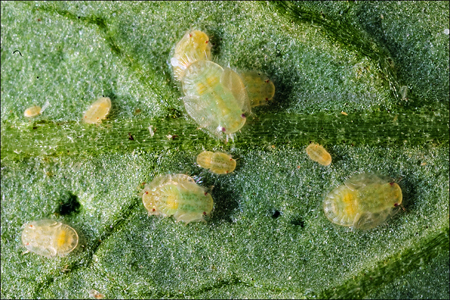Zebra chip (ZC, also known as papa manchada and papa rayada) is a disease that is affecting potato production in the southwestern United States and in other countries, and which has been linked to potato psyllids (Bactericera cockerelli, which infests both potatoes and tomatoes) that harbor the bacterial plant pathogen ‘Candidatus Liberibacter solanacearum’.
Until recently, the epidemiology of ZC was unknown, motivating research to elucidate the spatial and temporal patterns of ZC infections in potato fields. Studies were performed in multiple commercial potato fields located in the Texas Panhandle, wherein locations of ZC-affected potato plants were georeferenced or counted within large plots and along belt transects consisting of contiguous 10-by-10-m quadrats. The frequency of ZC infections within belt transect quadrats was well described by negative binomial and zero-inflated negative binomial distributions, in agreement with observed clustering of infections and distance-based spatial statistical results.
Plant Disease, Volume 96, Issue 7, Page 948-956, July 2012.
By D. C. Henne, F. Workneh and C. M. Rush, Texas AgriLife Research
http://dx.doi.org/10.1094/PDIS-09-11-0805-RE
Via Knapco



 Your new post is loading...
Your new post is loading...






